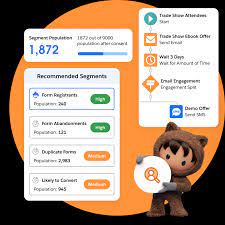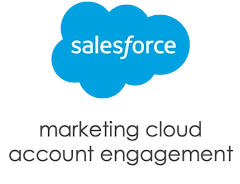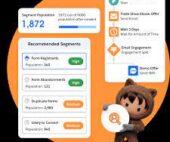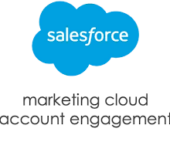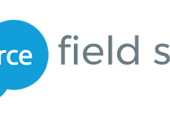When exploring marketing automation options on the Salesforce platform, you will encounter two Salesforce owned choices: Account Engagement or Marketing Cloud. However, discerning the key distinctions between Account Engagement, formerly Pardot, and Marketing Cloud is critical to selecting the best platform for your organization’s needs. Differentiating Pardot and Marketing Cloud.
Distinguishing itself from Pardot (Salesforce Marketing Cloud Account Engagement), Marketing Cloud is most suitable for transactional purchases across various channels. Marketing Cloud is commonly used more for communications with customers or members. Pardot, on the other hand, caters to ‘considered purchases’ characterized by prolonged sales cycles and involvement of multiple decision-makers. Account Engagement is commonly used more for communications with prospects or leads.
Many companies use both Marketing Cloud and Account Engagement.
While both tools share some surface-level similarities, it’s important to note that Pardot was renamed “Marketing Cloud Account Engagement” in 2022. By 2023 Marketing Cloud Account Engagement was more commonly referred to as Account Engagement. Marketing Cloud and Pardot (Account Engagement) leverage themselves as distinct marketing automation platforms with different areas of efficiency.
So, how does Account Engagement differ from Marketing Cloud? In this comparison of ‘Account Engagement vs Marketing Cloud,’ let’s debunk some misconceptions and present questions to aid in forming your own conclusions.
The Differences Between Account Engagement and Marketing Cloud
The common perception is that “Marketing Cloud is for B2C marketing, and Pardot (Account Engagement) is for B2B marketing.” However, this oversimplification may lead to frustration. Pardot (Account Engagement) caters to ‘considered purchases’ typical in B2B but not exclusively so. Marketing Cloud excels in transactional purchases across multiple marketing channels, typical of B2C but not exclusively.
Differentiating Pardot and Marketing Cloud
As the Salesforce ecosystem evolves, organizations marketing to consumers may involve considered purchases, while B2B accounts may engage in high-volume transactional purchases, such as self-service commerce.
‘Is Pardot a part of Marketing Cloud?’ and ‘Is Pardot Included in Marketing Cloud?’
The interpretation of ‘part of’ could mean two things:
- Built on the same product architecture.
- Marketed under the same brand umbrella.
In terms of product architecture, Account Engagement operates partly on its platform and partly on the core Salesforce platform. Marketing Cloud remains independent and does not function together with Account Engagement despite the name change. Pardot has undergone multiple transitions, from being independent to aligning with Sales Cloud and now falling under the ‘Marketing Cloud’ brand.
Account Engagement vs Marketing Cloud: The major differences
The primary difference lies in the buying cycle. Pardot is preferable for businesses with high-sales-value products/services and a complex sales journey involving multiple decision-makers. Marketing Cloud excels in social media marketing, advertising, and SMS campaigns.
Note that Marketing Cloud Social Studio is slated for retirement. Salesforce announced in 2022 that it would be retiring its Marketing Cloud Social Studio products. Social Studio users will lose access to their accounts on Nov. 18, 2024. If your contract ends before then, you’ll lose access on the final date of your agreement. Alternatives to legacy Social Studio will include Hootsuite, Sprout Social, Sprinklr Social, and others
Why is Marketing Cloud better than Account Engagement?
It is not necessarily better. Account Engagement focuses on B2B marketing, emphasizing alignment between marketing and sales, lead management, and marketing campaigns. In contrast, Marketing Cloud offers superior capabilities in social media marketing, advertising, and SMS campaigns.
Pardot and Marketing Cloud: Usage Statistics
Pardot and Marketing Cloud have been leading Salesforce marketing automation tools since 2013. By 2022, over 37,000 companies integrated Account Engagement with Salesforce, while over 22,000 businesses used Marketing Cloud.
Compare Account Engagement vs Salesforce Marketing Cloud pricing and features to choose the solution that best fits your business needs.






